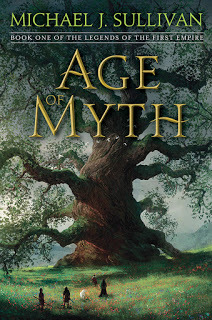
Book outlines are, in effect, plans. What do we all know about plans, whether they be of the battle preparations or the best laid sort? For the stories of plots, they usually don't survive and often go into the delete bin. Such was the case with
Age of Myth. I had my outline and my characters. I was building my story nicely, but trouble was brewing in the most unlikely of places—the tertiary character district. I can’t help it. Whenever I create any character, I create a person. Doesn’t matter if they have only a bit part, I make a whole individual. I can take greater chances with the third tier cast as the story doesn’t rest on them. In the case of
Age of Myth I kept making characters and those characters were unfortunately—great. I discovered I liked them a whole lot more than the main characters. They were far more interesting, more colorful, more tragic, and more emotionaly moving. That’s when a radical idea hit me.
Why not make them the main characters?
This was silly. These assortment of misfit toys from the reject pile can’t possibly carry a novel about heroes the likes of Achilles and Hercules…can they?
So many fantasy novels are about privileged princes or princesses, or skilled warriors, or powerful wizards doing grand things. How many are about average people—no—how many are about less than average people making a real difference and doing something truly extraordinary? Frodo and Sam come to mind. Dorothy of Kansas does, too. I liked the comparisons and set out to explore the possibility of doing something that surprised me, that I hadn’t been expecting. The more I thought about it, the more it excited me.
How much of history was created by people too small to be remembered by historians? Did the big names really do the things they are lauded for, or was it the efforts of a dozen quiet folk who might not be respectable enough to carry such a lofty mantle as "hero"?
The idea just kept picking up speed.
Wasn’t a huge part of why I liked Lord of the Rings because they seemed like ordinary people who succeeded at achieving amazing things?
What if the fate of mankind did not depend on the bravery of a muscular man with a broadsword and a gritty past. What if everyone owed their future to a cripple, an emotional shut-in, a self-centered bitch, and a little girl who likes stories a bit too much? Wouldn’t that be way more interesting? How could such a thing happen?
This idea is where Legends of the First Empire really started.
I didn’t change what I had written prior to this discovery. I didn’t want to. I like that the idea might creep up unseen on the reader the same way as it had with me. I wanted the reader to discover this amazing shift from the expected to the—are you kidding me? No way!
As a result, just like in my Riyria series (where I began with a slow build and familiar tropes only to later twisted them), I did it again. Didn’t mean to. Just happened.
I’m glad it did.
Tomorrow: Age of Myth, And So it Begins
 newest »
newest »
 newest »
newest »
 Can't wait to read! Several years ago I started to write a story (I swear someday I will actually finish it ...), and in deciding what I wanted my character to be like, I borrowed from The Hobbit. I liked that Bilbo's character, while not remotely the person in charge, often breaks away from what is expected of him and instead does what he feels is right - with great impact on the story. In the end, some of the choices he made didn't avert the bloodshed he was trying to avoid. But the fact that he made the difficult decisions (such as keeping the Arkenstone from Thorin), even though he lost the friendship of the dwarves for a time, shaped everything that happened and made his character not only likeable but surprising.
Can't wait to read! Several years ago I started to write a story (I swear someday I will actually finish it ...), and in deciding what I wanted my character to be like, I borrowed from The Hobbit. I liked that Bilbo's character, while not remotely the person in charge, often breaks away from what is expected of him and instead does what he feels is right - with great impact on the story. In the end, some of the choices he made didn't avert the bloodshed he was trying to avoid. But the fact that he made the difficult decisions (such as keeping the Arkenstone from Thorin), even though he lost the friendship of the dwarves for a time, shaped everything that happened and made his character not only likeable but surprising.




